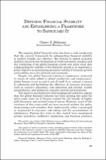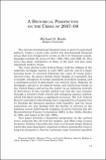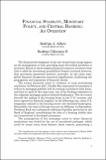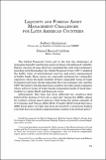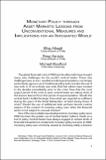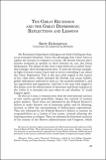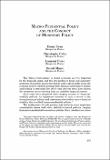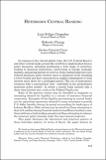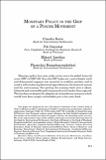Buscar
Mostrando ítems 21-30 de 38
Defining finacial stability and establishing a framework to safeguard it
The ongoing global financial crisis has been a rude awakening that the current framework for safeguarding financial stability is neither reliable nor effective. The threats to global economic stability caused by the dysfunction of credit and money markets and the weakening of the global banking system ...
A historical perspective on the crisis of 2007-08
The current international financial crisis is part of a perennial pattern. Today’s events echo earlier big international financial crises that were triggered by events in the U.S. financial system. Examples include the crises of 1857 1893 1907 and 1929–33. This crisis has many similarities to those ...
Financial stability monetary policy and Central Banking: an overview
The financial developments of the last decade had a large impact on the management of risk providing more diversified portfolios to investors. Based on these complex financial contracts investors were able to shift the investment possibilities frontier outward however that movement generated intricate ...
Liquidity and foreing asset management challenges for Latin America countries
The Global Financial Crisis put to the fore the challenges of managing liquidity and foreign assets at times of heightened volatility. Earlier concerns of some observers regarding the costs of precautionary hoarding notwithstanding the Global Financial Crisis (GFC) validated the buffer value of ...
Monetary policy thorugh asset markets: lessons from unconventional measures and implications for an integrated world
The global financial crisis of 2008 and its aftermath have brought many new challenges for the world’s central banks. These new challenges have in turn resulted in bold experimentation—not simply particularly vigorous use of traditional policy tools but also the use of new tools or if not entirely new ...
The great recession and the great depression: reflections and lessons
My Economics Department colleagues are fond of telling me that as an economic historian I have the advantage that I don’t have to update my lectures in response to events. My history lectures don’t become outdated as quickly as their lectures on say the Great Moderation. The fallacy of this view is ...
Macro-prudential policy and the conduct of monetary policy
The 'Great Contraction' in global economic activity triggered by the financial crisis and the extraordinary fiscal and monetary measures that public authorities had to undertake in order to put the economy back on track by putting public finances under heavy strains and leading to extremely low ...
Inflation targeting in financially stable economies: has it been flexible enough?
The international financial crisis and Great Recession of 2008- 09 called for a range of significant policy measures by central banks beyond aggressive interest rate cuts. Measures have ranged from improving international coordination to purchasing local private loan portfolios and direct intervention ...
Heterodox central banking
In response to the current global crisis the U.S. Federal Reserve and other central banks around the world have implemented diverse policy measures including purchasing a wide range of securities lending to financial institutions intervening in foreign exchange markets and paying interest on reserves. ...
Monetary policy in the grip of a pincer movement
Monetary policy has come under strain since the global financial crisis (GFC) of 2007–09. Once the GFC broke out central banks’ swift and determined response was essential to stabilise markets and to avoid a self-reinforcing downward spiral between the financial system and the real economy. But putting ...

